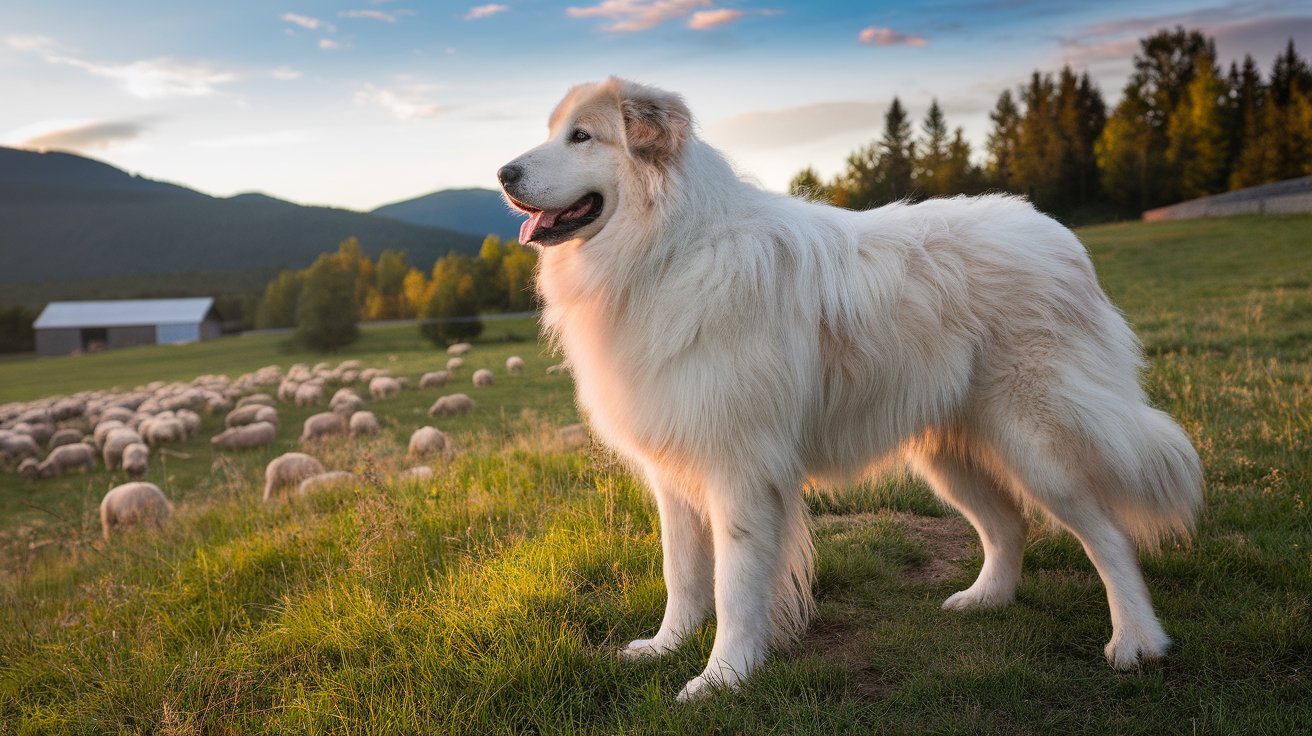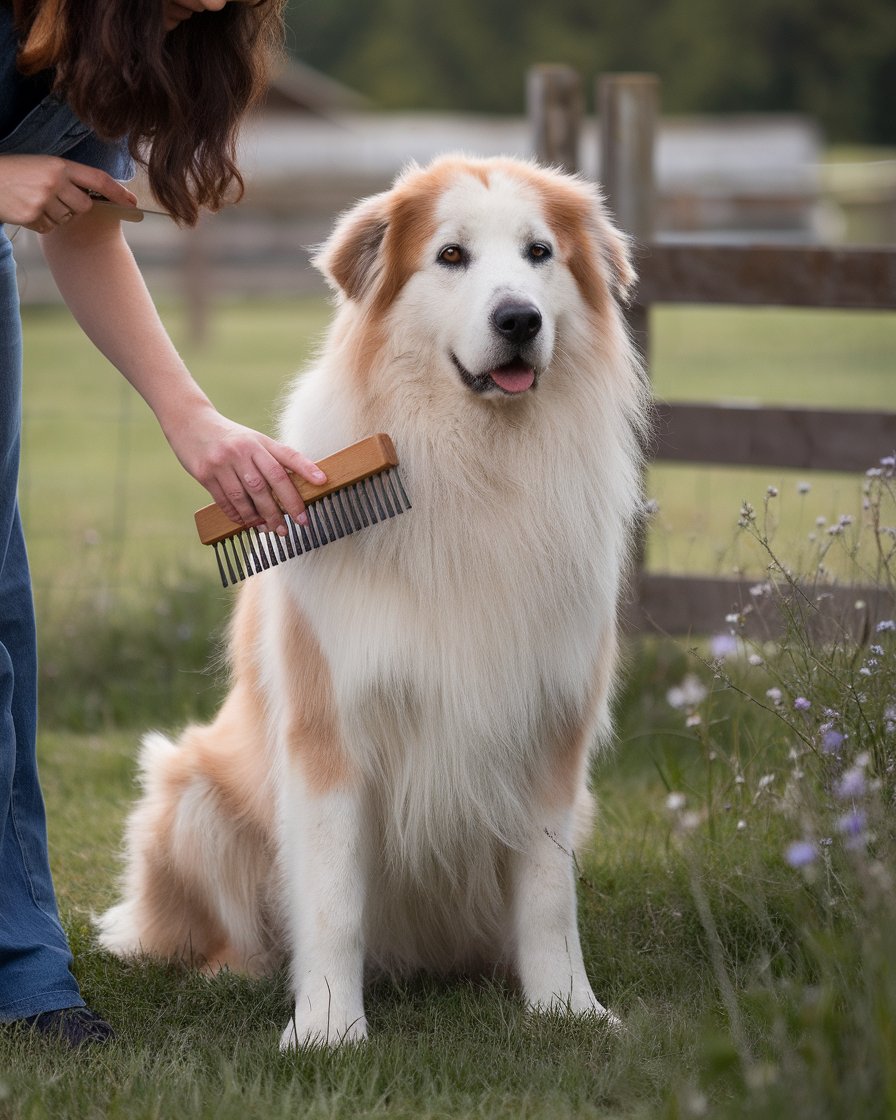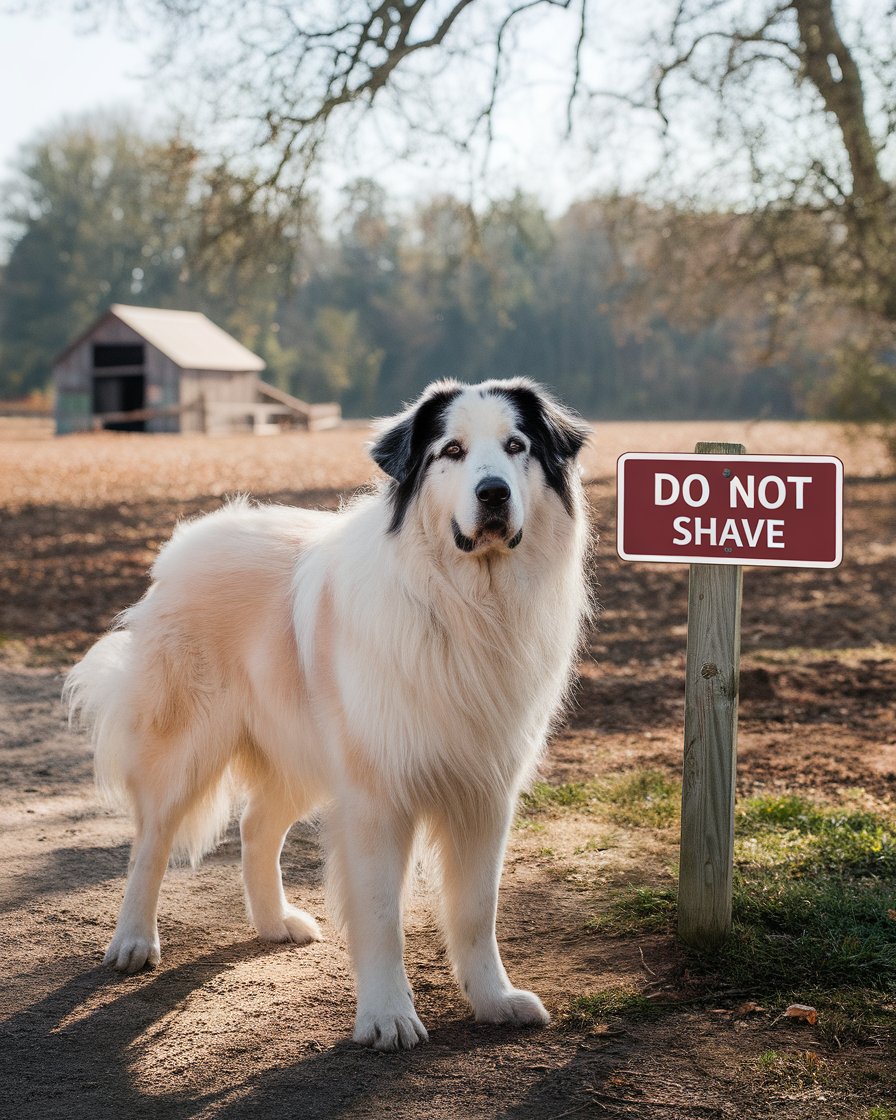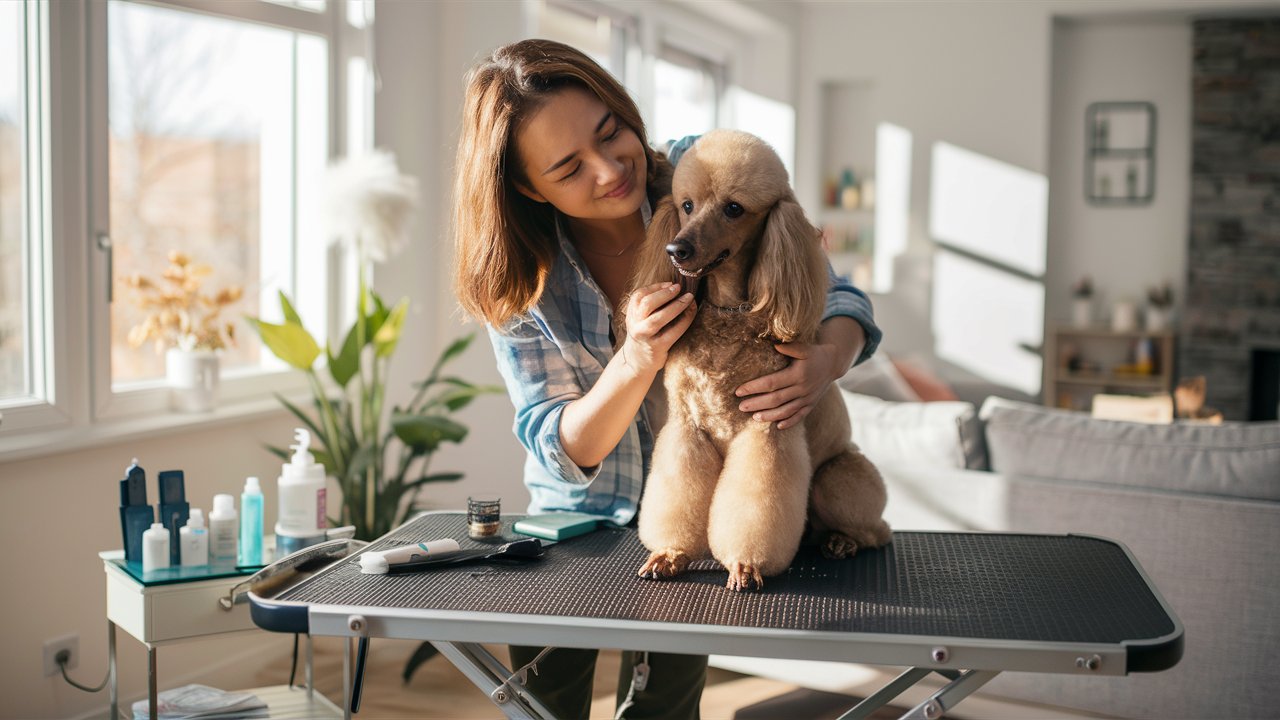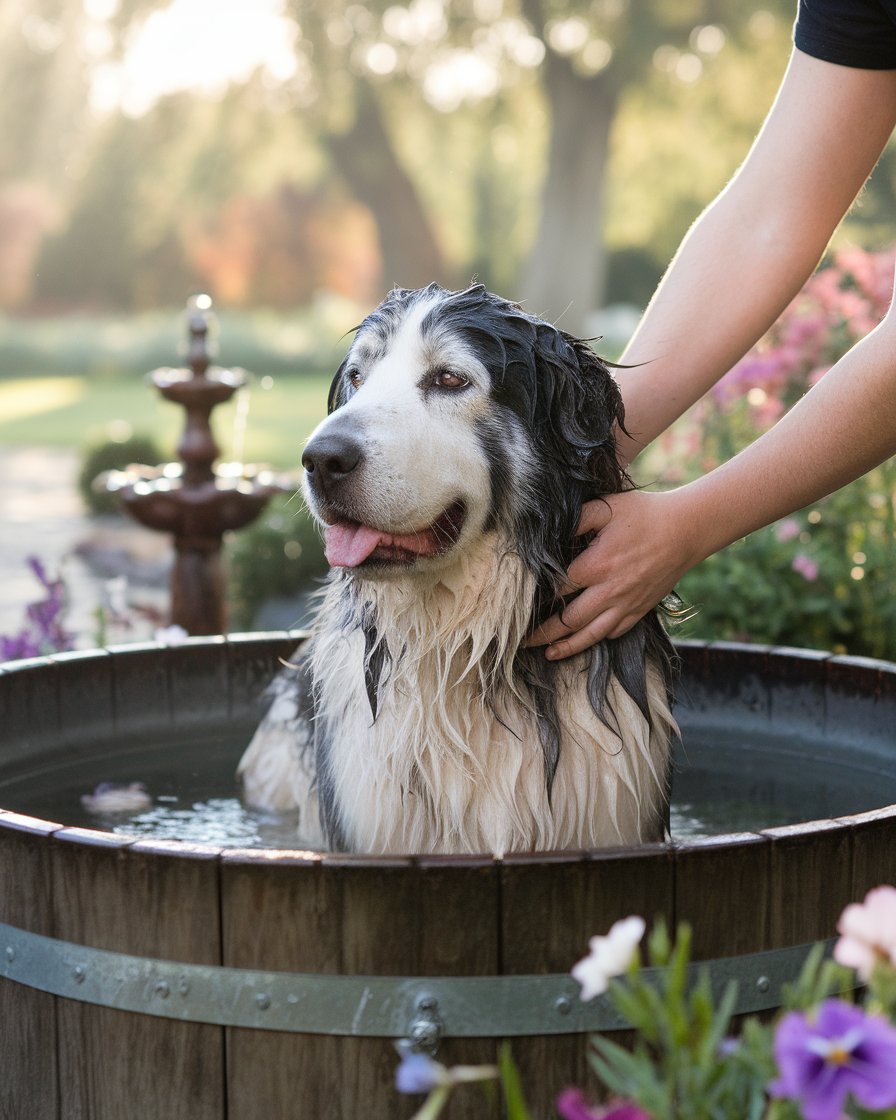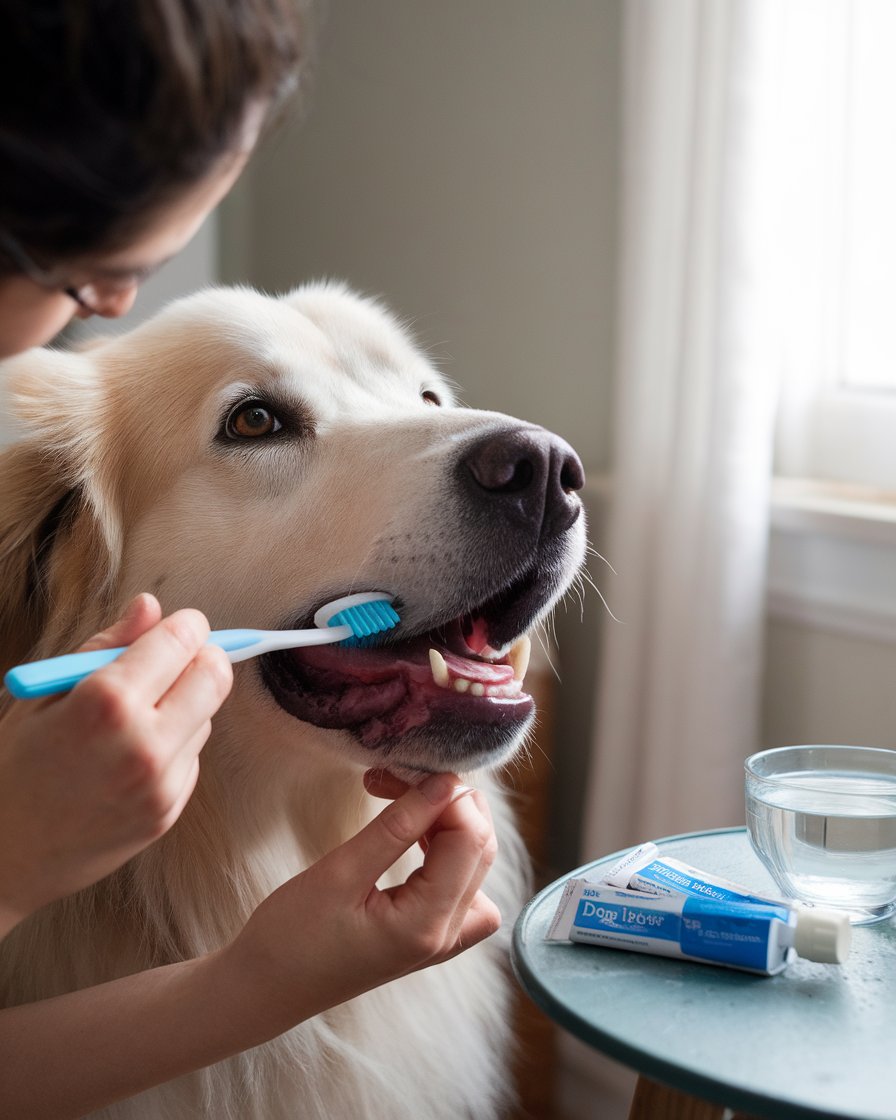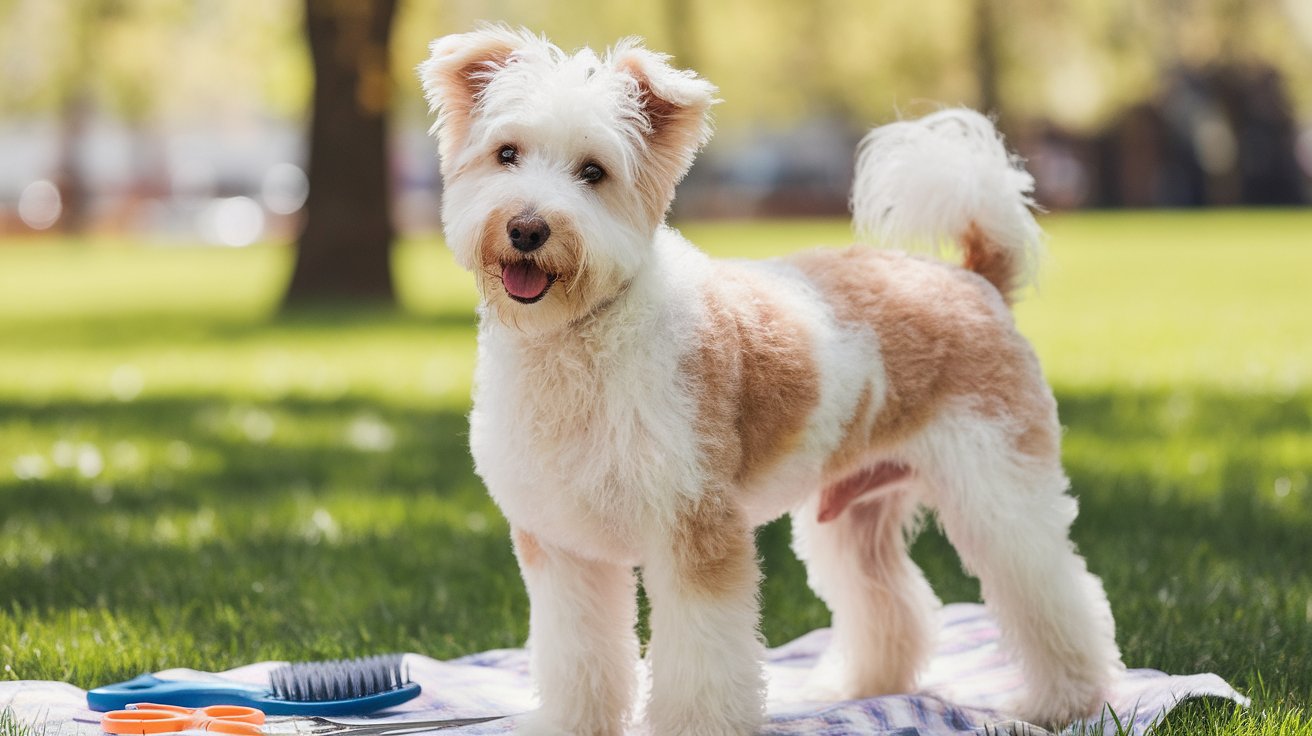Introduction
Grooming your Great Pyrenees is not just about making them look good—it’s about keeping them healthy and comfortable. These beautiful dogs have thick coats that need regular care. Their double coat helps protect them from the elements, but it also means they can easily get mats and tangles if they’re not brushed regularly. It’s super important to keep the dog clean by brushing and blow drying their fur after baths. The process keeps their coat in good shape and prevents issues like tangles, dirt, and mud from building up. For dogs that live outdoors, especially livestock guardian dogs, regular grooming is even more important to maintain their coat and overall health.
Taking care of a Great Pyrenees doesn’t stop at brushing. If you’ve adopted one from a great pyrenees rescue, they might need extra attention, especially if they’ve been neglected before. Using a grooming table can make the whole process easier. Make sure not to shave them, as their coat protects them from both the heat and cold. Instead, aim for basic trimming and brushing sessions. Using tools like a detangler or cotton balls can help make grooming quicker and less stressful for your dog.
Key Takeaways
- Great Pyrenees need regular grooming to keep their double coat clean and free from mats and tangles.
- Brushing helps protect their coat’s natural oils and prevents common issues like ear infections and ticks.
- It’s crucial to avoid shaving Great Pyrenees, as their coat protects them from both heat and cold.
- Bathing should be limited to twice a year to avoid stripping the coat of essential oils.
- Dental care, including brushing and dental chews, is important to prevent plaque buildup and keep their breath fresh.
- Using the right grooming tools, such as a slicker brush or grooming table, can make grooming easier and more effective.
Brushing Techniques for Great Pyrenees
Proper grooming is essential for maintaining the health and appearance of a Great Pyrenees. Known for their majestic double coats, these large working dogs require regular brushing to prevent mats and tangles. Their fur, with its soft undercoat and wiry outer layer, provides protection from the elements while keeping them cool in the summer and warm in the winter. Consistent grooming not only enhances their coat’s appearance but also helps prevent common issues like ear infections and ticks. Owners of Great Pyrenees, often called pyrs, should prioritize these grooming sessions, especially during the spring and fall when shedding is at its peak. A well-groomed pyr is a happy, healthy dog.
Key Brushing Techniques for Great Pyrenees
Brush Regularly to Maintain Coat Health
Great Pyrenees have a dense double coat that needs regular brushing, at least two to three times per week, to prevent mats and tangles. This routine keeps their coat in top condition while reducing shedding and preventing buildup of dirt and debris. The key is consistency, particularly during spring and fall when shedding is most intense.
Use the Right Grooming Tools
The right tools make all the difference when grooming a Great Pyrenees. A slicker brush and grooming rake are essential to reach both the soft undercoat and the coarser outer coat. The grooming rake is particularly useful for deep brushing without damaging the coat or hurting the dog’s skin. Focus on areas like behind the ears and the back legs where mats tend to form.
Focus on Comfort and Gentle Handling
Brushing should be a stress-free process for your Great Pyrenees. Start grooming sessions early in your dog’s life to help them become comfortable with the routine. Take extra care when brushing sensitive areas, such as the armpits and around the ears, to avoid causing discomfort. Regular, gentle grooming helps build a positive experience and keeps your pyr’s coat healthy.
Understanding the Double Coat of Great Pyrenees
The Great Pyrenees has a double coat that plays a vital role in their comfort and protection. The soft undercoat traps warmth during cold weather, while the longer, coarse outer coat repels dirt and moisture, helping the pyr stay clean. Brushing regularly is essential to manage both layers, preventing mats and tangles from forming. The coat helps shed dirt naturally, reducing the need for frequent baths. However, it’s crucial to use grooming tools like a slicker brush and comb to ensure you can penetrate through the thick fur and remove any debris or dirt that may accumulate, especially behind the ears and on the back legs.
Choosing the Right Grooming Tool: The Grooming Rake
To effectively groom a Great Pyrenees, the grooming rake is one of the best tools for the job. This wide-toothed tool allows you to reach deep into the double coat without pulling or hurting the dog’s skin. Regular use, especially during shedding seasons, prevents mats from forming and helps the coat remain healthy. Aim for brushing sessions at least two to three times a week, focusing on areas prone to tangling like the armpits and behind the ears. Early grooming sessions can help puppies grow comfortable with the process, ensuring stress-free maintenance as they grow into large, powerful working dogs.
Shaving Considerations for Great Pyrenees
When it comes to grooming Great Pyrenees, many owners may wonder if shaving their dogs is a good idea, especially during the hot summer months. However, due to their unique double-coated breed, shaving is not recommended. The thick undercoat and longer outer coat work together to regulate the dog’s body temperature, keeping them cool in the summer and warm in the winter. Removing this natural protection can lead to potential issues like sunburn and even overheating, as their coat helps shed dirt and keep their skin dry. It’s important to understand that Great Pyrenees are designed for the outdoors, and their coat plays a vital role in their overall health and comfort.
Case Study: The Impact of Shaving on Livestock Guardian Great Pyrenees
A study from various grooming and livestock experts highlights the long-term effects of shaving Great Pyrenees, particularly when used as livestock guardian dogs. Their dense double coat is designed to regulate temperature and protect against extreme weather conditions, from harsh winters to hot summers. Shaving removes the protective outer coat and disrupts their natural insulation, leading to potential overheating in summer and inadequate warmth in winter. Additionally, shaved coats tend to regrow unevenly, increasing the risk of skin irritations and sunburn. The coat also helps shed dirt naturally, keeping the dog clean without frequent baths. Livestock guardian dogs rely heavily on their coat for both protection and functionality. Instead of shaving, experts recommend regular brushing and targeted trimming in sensitive areas like behind the ears or around the paws. This approach ensures the dog’s comfort while maintaining their natural coat integrity.
The Myth of Shaving Great Pyrenees
Many believe shaving a Great Pyrenees will help them stay cooler during warmer weather, but this is a common misconception. Their double coat is specifically designed to provide insulation, keeping them cool in hot weather and warm in the cold. Shaving the coat disrupts this natural process, leading to potential harm, such as exposing the dog’s sensitive skin to harmful UV rays, which may cause sunburn. Additionally, shaved coats often grow back unevenly, causing discomfort and potential skin irritation. Instead of shaving, regular grooming sessions can manage loose hair and mats effectively, ensuring the pyr remains comfortable without removing their protective coat.
Alternative to Shaving: Basic Trimming and Sanitary Cut
Rather than shaving your Great Pyrenees, opting for basic trimming in key areas is a much better alternative. Focus on trimming the hair around the face, paws, and private areas to help maintain cleanliness and comfort. This approach helps avoid the issues caused by full shaving while ensuring your pyr stays well-groomed. Regular trimming around these areas, along with nail clipping and ear cleaning, will keep your dog comfortable and healthy. Basic grooming tools, such as a slicker brush or comb, can also be used to manage loose hair and dirt. Remember, the double coat is essential for temperature regulation and protection, so maintaining it with proper care is key.
Bathing Guidelines for Great Pyrenees
Bathing a Great Pyrenees is an important aspect of their grooming routine, but it’s not something that needs to be done often. These dogs are naturally equipped to stay clean with their double coat, which sheds dirt and mud. Over-bathing can strip their coat of essential oils, so it’s recommended to bathe them only twice a year. Timing your pyr’s baths around early spring and late summer helps remove the accumulated dirt while ensuring their skin remains healthy. During these seasonal cleanings, make sure to use the right techniques to avoid over-drying their skin or causing discomfort, especially with their thick coat.
Timing and Frequency of Baths for the Breed
Great Pyrenees, as a livestock guardian dog breed, don’t require frequent bathing, which makes grooming relatively low-maintenance. Bathing them twice a year is typically sufficient to keep them clean without disrupting their natural oils that protect their skin and coat. Outdoor dogs like pyrs may look dirtier due to their adventurous lifestyles, but a full bath isn’t always necessary. Instead, focus on seasonal baths in spring and summer when temperatures are warmer, and their coat is ready for a refresh. Bathing more frequently can result in dry, irritated skin, so it’s important to strike the right balance and allow the coat to self-clean.
Recommended Dog Shampoo for Sensitive Skin
Choosing the right shampoo is essential when bathing a Great Pyrenees, especially since their skin can be sensitive. Opt for a sulfate-free, plant-based shampoo that gently cleans without stripping away the protective oils that help keep the dog’s coat healthy. Shampoos designed for sensitive skin, preferably with soothing ingredients like aloe or oatmeal, will reduce irritation and make the bath more enjoyable for your pup. Avoid using human shampoos, as they can be too harsh for the pyr’s skin. After the bath, thoroughly blow-dry their thick coat to ensure moisture doesn’t get trapped, which could lead to discomfort or skin infections.
“Keeping our working dogs completely clean is impossible, but we like to bathe them twice a year. The weather is warmer, and who doesn’t like a good spring and fall cleaning?” – Hidden Heights Farm
Dental Care for Great Pyrenees
Caring for the dental health of a Great Pyrenees is just as important as grooming their coat or providing a balanced diet. These large dogs, known for their strength and loyalty, are prone to dental issues like plaque buildup and gum disease if proper care isn’t taken. Regular dental maintenance ensures they stay healthy and comfortable, reducing the risk of more serious health problems linked to poor oral hygiene. Neglecting their dental care can lead to bad breath, discomfort, and even infections. Therefore, consistent efforts to keep their teeth clean will contribute to their long-term well-being.
Importance of Dental Hygiene for Dogs
Dental hygiene plays a critical role in a Great Pyrenees’ overall health. Without regular cleaning, plaque can build up and lead to painful gum diseases like gingivitis, which can affect the dog’s ability to eat and even lead to tooth loss. For a working dog breed like the Great Pyrenees, maintaining strong teeth is essential to their active lifestyle. Routine dental checkups, paired with at-home care such as brushing and using dental-friendly toys, can make a big difference. Moreover, keeping a close eye on their breath is important, as bad breath can often be an early sign of dental issues.
Dental Care Tips to Keep Breath Fresh
Keeping your Great Pyrenees’ breath fresh and their teeth clean doesn’t have to be complicated. Adding dental chews to their diet is a simple way to help maintain oral hygiene. These chews help break down plaque and tartar while freshening breath. Additionally, brushing their teeth a few times a week with dog-specific toothpaste is one of the most effective ways to reduce plaque buildup. Always make sure to provide clean, fresh water to help rinse away food particles that can linger in the mouth. Regular dental care not only improves breath but also keeps your pyr happy and healthy for years to come.
Conclusion
Wrapping up, grooming your Great Pyrenees isn’t just about keeping them clean—it’s all about their comfort and health, too. These big pups, often known as livestock guardian dogs (lgd), have that thick, double coat that keeps them protected. But here’s the thing: don’t shave it off! Their coat does more than look good. It helps keep air to circulate, regulating their body temp and shielding them from dirt and mud. Instead, regular brushing can help with tangles and mats, using a grooming rake or slicker brush to fluff things out. And if you need to bathe them, use water and the right shampoo to protect that precious coat.
Besides their coat, make sure to check their ears, clip their dewclaws, and clean those tricky spots to avoid any discomfort. Regular care, like trimming and bathing with the right tools, will help your Great Pyrenees stay healthy. Stick to this routine, and your pyr will be all set for whatever the outdoors throws at them.

